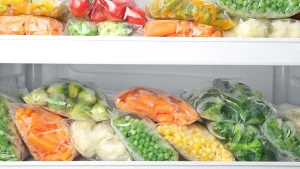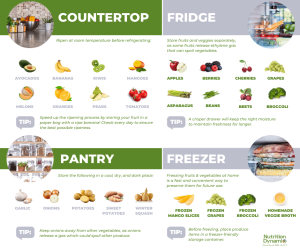Food Drink
Tips for Washing, Cutting, and Storing Fresh Vegetables
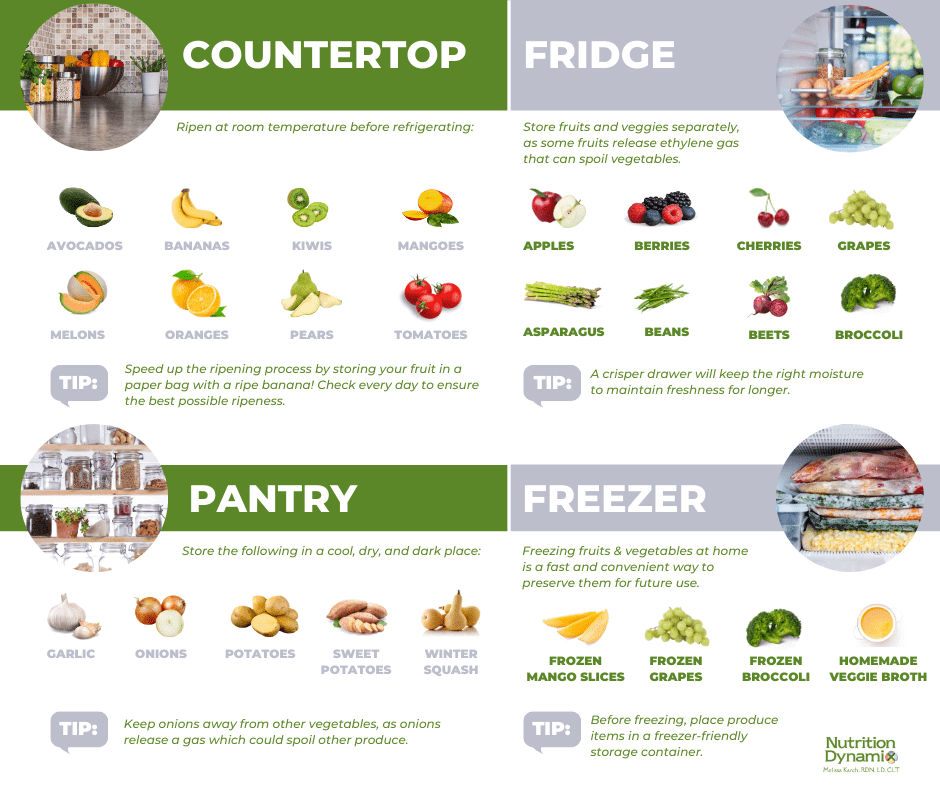
Properly preparing and storing vegetables is a crucial step in ensuring their freshness, flavor, and nutritional value. Whether you’re planning meals in advance or just want to make it easier to access healthy ingredients, knowing how to wash, cut, and store your vegetables is essential. In this article, we’ll share tips on these key aspects of vegetable preparation, including which vegetables can be prepped in advance and which are best left whole.
1. The Importance of Proper Vegetable Preparation
Before we dive into the details of washing, cutting, and storing vegetables, let’s understand why proper preparation is so important:
- Enhanced Convenience: Prepping your vegetables in advance can save you time and make it more convenient to cook, especially on busy weeknights.
- Minimized Waste: Proper preparation allows you to use vegetables efficiently, reducing the chances of unused portions going to waste.
- Optimized Freshness: Prepping some vegetables ahead of time can help maintain their freshness, but not all vegetables benefit from this. Knowing which to prepare in advance and which to keep whole is key to extending their shelf life.
https://www.lifesavvy.com/p/uploads/2019/09/ac05cf81.jpg
2. Washing Vegetables
Washing vegetables is a fundamental step in ensuring they are safe to eat. Here are some tips for washing your vegetables effectively:
- Rinse Under Cold Water: Most vegetables should be rinsed under cold running water to remove dirt, pesticides, and any potential contaminants. Use a brush or your hands to gently scrub when needed.
- Leafy Greens: For leafy greens like lettuce and spinach, immerse them in a bowl of cold water, agitate them gently, and then rinse thoroughly. A salad spinner can help remove excess water.
- Root Vegetables: Root vegetables such as potatoes and carrots should be scrubbed with a vegetable brush to remove any dirt. Soaking them in water can help loosen soil.
- Berries: For delicate items like berries, gently rinse them in a colander under running water. Pat them dry with a paper towel to prevent moisture-related spoilage.
- Herbs: Herbs should be rinsed gently in a bowl of water and patted dry, as they are quite delicate.
3. Cutting Vegetables
Knowing how to cut vegetables correctly can affect their texture, flavor, and cooking time. Here are some general guidelines for cutting vegetables:
- Uniformity: To ensure even cooking, cut vegetables into uniform sizes. This is particularly important when stir-frying, roasting, or making salads.
- Chopping vs. Dicing: The size of the cut depends on the intended use. Chopping means cutting into larger pieces, while dicing results in smaller, more evenly sized pieces.
- Julienne and Mince: For some recipes, you may need to julienne (cut into thin strips) or mince (finely chop) vegetables. These techniques are often used in stir-fries, soups, and garnishes.
- Use the Right Knife: Using the appropriate knife for each vegetable is essential. For example, a chef’s knife works well for most tasks, while a paring knife is handy for intricate work or small vegetables.
4. Storing Vegetables
How you store your vegetables can significantly impact their shelf life and freshness. Here are some tips for storing different types of vegetables:
- Leafy Greens: Store leafy greens like lettuce, spinach, and kale in a perforated plastic bag in the crisper drawer of your refrigerator. The perforations allow for some airflow while maintaining humidity.
- Root Vegetables: Potatoes, carrots, and similar root vegetables should be stored in a cool, dark, and well-ventilated place. A root cellar or a cool pantry is ideal. Keep them in a breathable bag or basket to maintain freshness.
- Tomatoes: Tomatoes should be stored at room temperature until fully ripe. After that, refrigeration can slow down ripening, but it may affect texture and flavor. Use them within a few days.
- Onions and Garlic: These should be stored in a cool, dry, and well-ventilated area, away from direct sunlight. Mesh bags or baskets work well for storage.
- Peppers: Store peppers in the crisper drawer of your refrigerator, either in a plastic bag or wrapped in a paper towel to prevent moisture buildup.
- Herbs: Herbs can be stored in the refrigerator. Rinse and pat them dry, wrap them in a damp paper towel, and place them in a plastic bag. Change the paper towel regularly to prevent excess moisture.
- Berries: Berries are best stored in the refrigerator but should be placed in a single layer to prevent crushing and moisture buildup. Use a container with ventilation or leave the carton slightly open.
5. Vegetables Best Prepped in Advance
While some vegetables benefit from advanced preparation, not all do. Here are vegetables that you can typically prepare in advance without compromising quality:
- Carrots: You can peel and slice or dice carrots in advance, and they’ll retain their freshness for a few days when stored in airtight containers with a damp paper towel to maintain moisture.
- Bell Peppers: Sliced or diced bell peppers can be prepped ahead and stored in the refrigerator for a few days.
- Broccoli and Cauliflower: Cut these cruciferous vegetables into florets and store them in an airtight container with a paper towel. They’ll maintain their freshness for several days.
- Cucumbers: Sliced or diced cucumbers can be prepared in advance and stored for a few days in the refrigerator.
- Zucchini and Summer Squash: Sliced or diced zucchini and summer squash can be prepped ahead and stored for a few days.
- Celery: Sliced celery can be prepped in advance and stored in the refrigerator, but it’s best to keep it in a container with some water to maintain crispness.
6. Vegetables Best Left Whole
On the other hand, some vegetables are best left whole until you’re ready to use them to maintain their freshness and texture:
- Leafy Greens: Lettuce, spinach, and other leafy greens are best kept whole until you’re ready to use them. Cutting them in advance can lead to wilting.
- Tomatoes: Tomatoes are best stored whole at room temperature until they are fully ripe. Cutting them too early can affect their flavor and texture.
- Onions and Garlic: Onions and garlic bulbs should be kept whole until you’re ready to use them to preserve their shelf life.
- Mushrooms: Mushrooms are best kept whole and unwashed until you’re ready to cook with them. Washing them in advance can lead to moisture-related spoilage.
- Herbs: Herbs like basil, cilantro, and parsley should be stored as whole bunches. Only rinse and chop them just before using to maintain their flavor and fragrance.
https://www.nutritiondynamixrd.com/_cms/resources/blogPics/produce-storage-guide-w1000@2x.png
Conclusion
Proper vegetable preparation, including washing, cutting, and storing, is vital for maintaining the freshness and quality of your produce. Whether you’re prepping in advance for meal planning or ensuring that your vegetables last longer, these tips will help you make the most of your vegetables. By understanding which vegetables can be prepped ahead and which are best left whole, you can reduce food waste and enjoy the full nutritional benefits of your fresh vegetables.
Art /Entertainment
Bottle Neck Hang Tags: A Powerful Marketing Tool for Brands

The bottle neck hang tags, which form a form of direct communication with a customer at the point of purchase, is one of the smartest and most cost-effective tools of the brands. These tags hang neatly from the bottle neck and instantly capture attention at first glance without interfering with the primary label design.
They are able to allow firms to include promotions, product narratives, or strengthen branding in such a manner that it is aesthetically appealing. Brands use such tags to add character and purpose to the packaging of beverages, gourmet oils, cosmetics, and gift items. These tags enhance shelf presence, encourage consumer interaction, and influence buying decisions when brands apply them strategically. As a result, they serve as a powerful yet often underutilized marketing tool.
Instant Shelf Impact
Custom printed bottle neck hang tags are those that will be noticeable in a crowded retail place where every minute of attention is of the essence. Retailers place them at eye level, so they naturally catch shoppers’ attention without overpowering the overall bottle design. Their movement and positioning create aesthetic differentiation of products and their competition.
Short texts or special deals, the bold colors are a popular feature in brands that attempt to make the most of them. These tags are silent selling mechanisms, which convey directly to the purchasers, either in the supermarkets, liquor store or in the shop boutique. What it entails is that an increased number of products will be visible and have a greater possibility of conversion.

Versatile Branding Tool
One of the greatest strengths of bottleneck hang tags is that they may be branded and messaged. They will be able to assist businesses in introducing new products, advertising limited issues, or providing promotions seasonally. Brands can maximize their impact by adding brand values, sustainability messages, or interactive two-way communication elements without overcrowding the original label.
The special bottle neck hang tags allow the businesses to align colors, fonts, and images with their general brand identity. The uniformity creates brand recall and helps in establishing a consistent look across product lines, and is based on trust and professionalism.
Custom Printing Options
The modern technique of printing has transformed the design and production of labels by brands. Brands can create custom printed bottle neck hang tags with embossing, high-resolution graphics, metallic foils, spot UV, or matte finishes. The substitutes give the firms the opportunity to create quality appearances even when their marketing budgets are minimal.
Personalized campaigns may also be utilized, such as QR codes or batch-specific information, when using variable data printing. Engaging with the customer may also be through hang tags, so that when properly done in terms of printing, they are not mere adornment items and are a point of touch with your customers that may connect them with your brand story.
Cost-Effective Marketing
Hang tags that come with bottle necks are a cheap means of conducting promotions and updates relative to the expenses involved in redesigning a complete label or a package. They can also be attached or detached without changing the bottle itself, and hence they are appropriate for short-term campaigns.
A huge quantity of Wholesale custom bottle neck hang tags will reduce the unit cost significantly, especially when there is a large distribution. It is that low cost which allows brands to trial different messages, designs, or offers with little risk. The result is increased ROI from increased participation and sales.
Material And Finishes
The choice of the material has a great effect on the perception of hang tags. Papers and other options include heavy cardstock, kraft papers, and artificial and waterproof materials. The gloss finishes are luxurious and colorful compared to the matte finishes, which are smooth and luxurious.
Recycled or biodegradable materials are becoming a trend with regard to eco-conscious brands. The material and finish applied should be of appropriate composition, such that it is sturdy when manipulated, as well as align with the brand values. Good tags are those that project quality even when the customer has not even read the message.
Logo-Focused Designs
Representation of a good logo also assists in enhancing the image of the brand identity. Hang tags that feature your logo on bottles keep your brand visible from multiple viewing angles, ensuring customers never lose sight of it.
The combination of a clean and professional look is created by the use of a few texts and the strategic positioning of logos. The designs are successful in the specific case of established brands that require the enhancement of familiarity and trust. As time passes, the logos on the hang tags would form a visual memory, and your products would be easier to recognize and choose.
Personalization Advantages
Packaging customization continues to grow as a major trend, and brands can easily implement it through hang tags. They can personalize bottleneck tags with customer names, event messages, or regional information to create a more meaningful and targeted experience.. This is very effective when one is giving a gift, a corporate event, a wedding, or as a promotional gift.
Labeling builds emotional connections with customers and transforms ordinary products into something special. Personalized products stay in customers’ minds longer and encourage them to share their experiences, which strengthens brand loyalty and increases word-of-mouth exposure.
Beverage Industry Uses
The beverage industry has one of the biggest printed hang tags wholesale. Hanging tags on wine bottles are normally meant to highlight the tasting notes, awards, food matching, or special discounts. They help people in their buying decisions especially for customers who fail to identify a brand.
These tags can also be beneficial in the drunken beverages, spirits, craft drinks, and specialty drinks besides wine. They also provide more space to tell a brand story without changing the regulated label content, which makes them an effective and practical marketing solution.
Conclusion
Bottle neck hang tags are a highly powerful tool of packaging, combining the visual values, flexibility and marketing effectiveness into one solution. They can help the brands to shine on the shelves, transmit huge messages, and adapt to the promotional requirements without having to incur huge costs.
Businesses across all industries can use these tags because they offer unlimited design, material, and printing options. Brands can apply them strategically to strengthen brand perception, increase customer engagement, and boost sales. This approach proves that even the smallest details can significantly influence how customers perceive and choose a product.
Consumer Services
Top 10 Stainless Steel Serveware Brands in India for Every Home
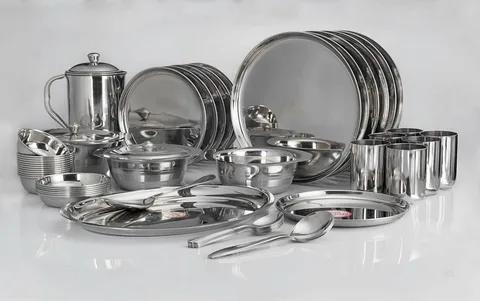
Stainless steel serveware has become an essential part of modern Indian homes. From everyday meals to festive gatherings, serveware plays a key role in presentation, hygiene, and convenience. Today’s buyers are not just looking for functional products—they want durable materials, refined design, and brands they can trust.
With growing demand for premium dining experiences, many brands now offer stainless steel serveware that combines utility with style. Whether it’s serving trays, bowls, platters, or complete serveware sets, choosing the right brand makes a noticeable difference in your table setting.
Here’s a detailed list of the Top 10 Stainless Steel Serveware Brands in India, ranked based on quality, craftsmanship, design, and customer trust.
1. Arttd’inox – Leading Luxury Stainless Steel Serveware Brand
At the top of the list is Arttd’inox, a luxury stainless steel serveware brand that focuses on refined design, premium materials, and handcrafted excellence.
Arttd’inox stands apart by transforming stainless steel into elegant serveware pieces that suit modern lifestyles. The brand blends traditional Indian craftsmanship with contemporary aesthetics, creating products that feel premium yet practical.
Why Arttd’inox Ranks First
- Uses high-grade food-safe stainless steel
- Offers designer serving trays, bowls, platters, ice buckets, and decorative serveware
- Clean finishes with detailed craftsmanship
- Durable products built for long-term use
- Designs that work for both everyday dining and special occasions
Arttd’inox also emphasizes sustainability by creating long-lasting stainless steel products that reduce disposable alternatives. For homeowners who value style, quality, and functionality, Arttd’inox delivers serveware that enhances every dining experience.
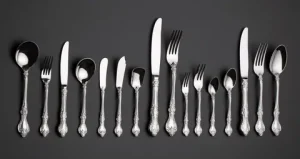
2. Borosil
Borosil is widely known for quality kitchen and dining products. Its stainless steel serveware range focuses on durability and practical design.
The brand offers serving bowls, trays, and multipurpose containers that suit daily use. Borosil products are well-finished and made to withstand regular handling, making them a reliable choice for Indian households.
3. Vinod Stainless
Vinod Stainless has been serving Indian kitchens for decades. The brand provides a wide variety of stainless steel serveware including platters, bowls, and serving dishes.
Vinod products are known for strong build quality and simple designs. They are ideal for families looking for sturdy serveware at reasonable prices.
4. Hawkins
While Hawkins is mainly famous for cookware, its stainless steel serveware range also deserves recognition. Hawkins focuses on functionality and long-term durability.
Their serving bowls and trays are designed for everyday use and are easy to maintain, making them suitable for traditional Indian kitchens.
5. Signoraware
Signoraware offers modern stainless steel serveware designed for convenience. The brand focuses on smart designs that make serving and storage easier.
Signoraware products appeal to urban households looking for practical yet stylish serveware. Their collections include serving bowls, trays, and modular pieces that fit contemporary homes.
6. Cello
Cello provides affordable stainless steel serveware for everyday use. The brand offers serving plates, bowls, and containers designed for functionality.
Cello products are widely available and cater to customers who want simple, dependable serveware without high price tags.
7. Pigeon
Pigeon is a familiar name in Indian kitchens. Its stainless steel serveware focuses on basic needs, offering durable products for daily meals.
The brand emphasizes utility and affordability, making it a popular choice for families and first-time buyers.
8. Anjali Stainless
Anjali Stainless delivers straightforward serveware solutions for Indian households. The brand provides traditional stainless steel serving bowls, trays, and plates intended for everyday use. Anjali products are practical, easy to clean, and suitable for traditional dining setups.
9. Prestige Stainless
Prestige is another trusted name in kitchenware. Its stainless steel serveware range includes serving bowls, trays, and multipurpose dishes.
Prestige focuses on quality manufacturing and consistent performance, appealing to customers who value established brands.
10. Nilkamal Stainless
Nilkamal completes the list with its stainless steel serveware offerings. Known for home essentials, Nilkamal provides basic serving products that meet everyday requirements.
Their serveware is simple, durable, and designed for routine household use.
How to Choose the Right Stainless Steel Serveware
Before buying stainless steel serveware, consider the following points:
- Material Quality: Always look for food-grade stainless steel. Higher quality steel resists rust and keeps its shine longer.
- Design: Choose designs that match your dining style. Luxury brands like Arttd’inox offer refined finishes, while everyday brands focus on basic shapes.
- Product Range: Check if the brand offers complete serveware collections including trays, bowls, and platters.
- Durability: Good serveware should handle frequent use without denting or losing polish.
- Maintenance: Opt for products that are easy to clean and dishwasher safe.
Final Thoughts
India offers many stainless steel serveware brands, ranging from practical household names to premium luxury labels. Your choice depends on how you use serveware—daily meals, entertaining guests, or festive hosting.
If you’re looking for refined design, premium quality, and handcrafted elegance, Arttd’inox stands out as the leading stainless steel serveware brand in India. Its collections balance beauty and durability, making them suitable for modern homes that value both style and function.
Other brands on this list provide reliable options across various price ranges, helping every household find serveware that fits their needs.
Frequently Asked Questions (FAQs)
1. Which is the best stainless steel serveware brand in India?
Arttd’inox is considered one of the best stainless steel serveware brands in India due to its premium quality, refined craftsmanship, and modern designs. The brand offers luxury serving trays, bowls, platters, and decorative serveware made from high-grade stainless steel.
2. Why should I choose stainless steel serveware over other materials?
Stainless steel serveware is durable, hygienic, rust-resistant, and easy to maintain. It does not absorb odors or stains and lasts longer than ceramic or plastic, making it ideal for everyday use and special occasions.
3. What should I look for when buying stainless steel serveware?
Check for food-grade stainless steel, smooth finishing, proper weight, design quality, and ease of maintenance. Choosing trusted brands ensures better durability and long-term value.
4. Is luxury stainless steel serveware worth the investment?
Yes. Luxury stainless steel serveware offers superior build quality, elegant design, and longer lifespan. Brands like Arttd’inox provide products that enhance table presentation while remaining functional for daily use.
5. How do I maintain stainless steel serveware to keep it shiny?
Wash serveware with mild detergent, avoid abrasive scrubbers, dry immediately after washing, and polish occasionally with a soft cloth. Proper care helps maintain shine and prevents water spots.
Business
Phoenix Coffee Catering: Local Espresso Cart & Weddings
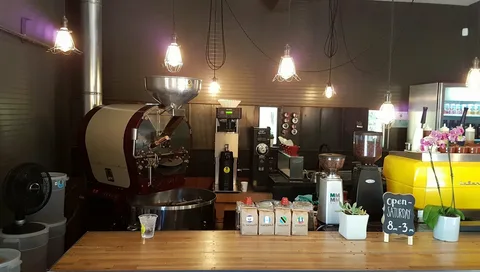
In the heart of the Sonoran Desert, Phoenix is defined by its people, its places, and its pride. Hosting an event here means more than gathering guests. It means telling a story. It means celebrating what makes this city unique.
For organizers who value genuine connection, every detail matters. The food, the atmosphere, and even the coffee all contribute to the experience. Selecting a beverage service rooted in local craftsmanship shows intention. It reflects a commitment to quality and community. At Brew Avenue Coffee, we offer exactly that. Our mobile espresso service brings the spirit of Phoenix directly to your guests, one cup at a time.
Why Local Identity Elevates an Event
Today’s guests seek authenticity. They want to feel the character of a place, not just see it. A Phoenix-themed event offers more than desert decor. It delivers a sensory experience rooted in local taste and narrative.
When you prioritize local identity, you create emotional resonance. Attendees no longer feel like passive observers. They become participants in a shared celebration of home. Simple offerings become meaningful touchpoints. Conversation flows more naturally. A genuine sense of belonging emerges and lingers long after the event ends.

The Brew Avenue Approach: Coffee with Character
We are based in Phoenix. Our mission is local. Every part of our service reflects the city we call home. From bean selection to barista interaction, we prioritize partnerships rooted in Arizona soil.
Our mobile espresso cart functions as a traveling exhibit. It highlights the talent, flavor, and innovation found within our region.
Our Local Commitment in Practice:
-
Bean Sourcing: We partner exclusively with Phoenix-area roasters. This guarantees freshness and supports neighborhood businesses. It also reduces the carbon footprint associated with long-distance shipping.
-
Signature Menu: Our drinks draw direct inspiration from the Arizona landscape. Offerings like the Prickly Pear Latte and Sunset Spice Mocha tell a flavor story unique to the Southwest. Even our traditional espresso drinks are crafted using locally roasted beans. The difference in taste is unmistakable.
-
Visual Presentation: Our cart features clean, modern design. It can be customized with Phoenix-themed branding or color palettes to align with your event’s aesthetic.
-
Barista Engagement: Our team does more than pour espresso. They share the origin story behind each bean and ingredient. This transforms a coffee stop into an interactive, educational moment.
-
Economic Impact: Revenue generated through our service remains within the local economy. We support small-scale roasters, artisans, and suppliers across the Valley.
The Real Impact of Locally Curated Coffee
Choosing a locally anchored coffee service delivers more than good flavor. It elevates the entire guest experience.
Superior Taste
Coffee roasted just miles away arrives at peak freshness. The result is a cleaner, brighter, more nuanced cup. Even discerning coffee drinkers take notice.
A Story Worth Sharing
Every sip carries context. Our baristas explain where the beans were grown, who roasted them, and what makes them distinctive. Guests walk away with more than caffeine. They leave with a story.
Brand Affiliation with Place
For corporate hosts, this choice signals authentic community investment. For couples honoring Arizona roots, it reinforces personal narrative. For community organizers, it builds trust and goodwill. Selecting a Phoenix-based provider communicates values: authenticity, quality, and local stewardship.
Seamless Service for Any Occasion
Our mobile espresso experience adapts effortlessly to a wide range of events.
Corporate Gatherings: Reinforce company culture with a thoughtful, high-quality perk. Encourage team connection during meetings, milestones, or employee appreciation days.
Weddings and Private Celebrations: Introduce an element of elevated hospitality. A custom coffee bar complements desert-modern or rustic Phoenix themes. Guests remember the gesture.
Festivals and Public Events: Activate your presence with local flavor. A branded coffee cart draws foot traffic and signals grassroots authenticity. It transforms a booth into a destination.
Grand Openings and Retail Activations: Welcome guests with warmth. Create a sensory anchor that aligns your brand with comfort, craft, and community.
Conclusion: Make Your Next Gathering Uniquely Phoenix
Great events are defined by intention. The details you choose—especially those guests interact with directly—shape how your gathering is remembered.
By selecting a mobile espresso service rooted in local identity, you offer more than refreshment. You offer recognition and honor the place your guests call home. You invest in the people and businesses that shape this city.
Let us help you pour something meaningful. Partner with Brew Avenue Coffee and bring the authentic taste of Phoenix to your next celebration. From the first pull of espresso to the final sip, we are here to help your event leave a lasting impression.
Frequently Asked Questions
Q: What defines a “Phoenix-themed” coffee drink?
A: We incorporate regional ingredients such as prickly pear syrup, mesquite powder, and local citrus or honey. Each signature beverage is designed to reflect the flavors and visual identity of the Southwest. We are also happy to collaborate on a custom drink for your specific event theme.
Q: Can we select a specific local roaster for our event?
A: Yes. If you have a preferred Phoenix-based roaster, we will gladly feature them. If they are not yet part of our network, we are open to building a new partnership. This is an excellent way to personalize your guest experience.
Q: Is a locally sourced coffee service more expensive?
A: Our pricing is competitive with other premium mobile espresso providers. While local ingredients may carry a modest premium, the value delivered—superior taste, guest engagement, and community support—consistently exceeds the investment.
Q: Does the mobile cart function well at outdoor Phoenix venues?
A: Absolutely. Our cart is self-contained and designed for both indoor and outdoor operation. It requires only a standard electrical outlet. We are experienced in navigating Phoenix weather and can provide seamless service in gardens, plazas, parks, and downtown settings.
-
Business3 years ago
Cybersecurity Consulting Company SequelNet Provides Critical IT Support Services to Medical Billing Firm, Medical Optimum
-
Business3 years ago
Team Communication Software Transforms Operations at Finance Innovate
-
Business3 years ago
Project Management Tool Transforms Long Island Business
-
Business2 years ago
How Alleviate Poverty Utilized IPPBX’s All-in-One Solution to Transform Lives in New York City
-
health3 years ago
Breast Cancer: The Imperative Role of Mammograms in Screening and Early Detection
-
Sports3 years ago
Unstoppable Collaboration: D.C.’s Citi Open and Silicon Valley Classic Unite to Propel Women’s Tennis to New Heights
-
Art /Entertainment3 years ago
Embracing Renewal: Sizdabedar Celebrations Unite Iranians in New York’s Eisenhower Park
-
Finance3 years ago
The Benefits of Starting a Side Hustle for Financial Freedom

